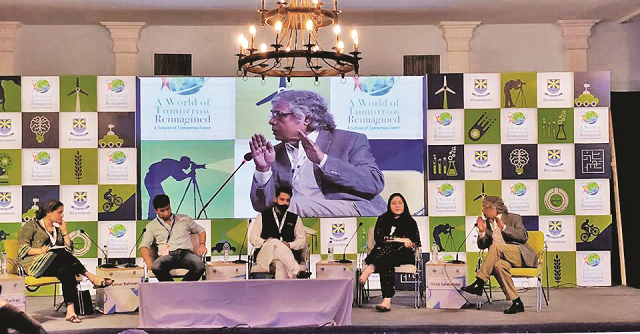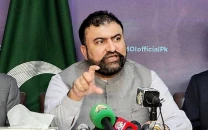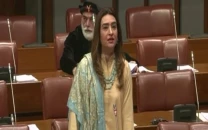‘Real change will only come if the oppressed are given equal opportunity’
Politicians, celebrities, academics, activists and journalists share insights for a better tomorrow

PHOTO: COURTESY SOT EVENT
SOT Events started as a conference series in the year 2000 and are organised by the Beaconhouse as part of its ongoing commitment to social responsibility.
The SOT, 2018 conference included 40 sessions with more than 100 national and international politicians, celebrities, academics, social activists and journalists from 15 countries sharing their thought-provoking ideas, life altering perspectives and unique insights for a better tomorrow.
The event featured panel discussions, workshops, interactive exhibitions and performances highlighting the need to address some of the key emerging issues facing the country and the solutions for a better future.
Conference: Government working on adaptive usage of heritage buildings, says minister
There is no Truth, Just Narratives
One of the panel discussions, moderated by journalist Zebunnisa Burki, addressed the issue of fake news and media censorship with Federal Information Minister Fawad Chaudhry, Canadian-Iranian filmmaker Gelareh Kiazand, education activist Qasim Aslam, British-Pakistani journalist George Fulton and Ukranian journalist Olga Yurkova as its panelists.
"The biggest problem the government is facing right now is how to control fake news and distinguish it from authentic news. The main challenge we [the government] face is to judge which fake news on social media could be potentially dangerous for the nation," shared Chaudhry.
He announced that the government is formulating a policy that would lead the Pakistan Electronic Media Regulatory Authority (Pemra) to regularise content on social media. The government had already launched a 'Fake News Buster' account on Twitter to control the influx of fake news spread through social media, according to Chaudhry.
Highlighting some ways the issue of fake news could be tackled, Kiazand said, "We need to check our sources in order to control fake news. We should know who is making it? Why are they writing it and what is their perspective?"
Lahore-based education activist Aslam stressed on the need to teach youngsters how to raise questions. "Unfortunately, we live in a society where people are forced to accept someone else's truth or face the consequences," he regretted.
Agreeing with Aslam, Fulton stressed the need to empower children to analyse facts. "We learn a lot from Twitter and Facebook. It should not be the government's job to regularise social media," he opined.
According to Yurkova, her media rights organisation - StopFake.org - has analysed more than 10,000 news sources, such as videos, pictures and articles in her country, of which more than 3,000 were fake news. "The only way we can control fake news is through introducing media literacy for the masses," she said.
Sindh Theatre Festival commences at Arts Council
Is democracy always the best form of government?
A panel discussion on the present state of democracy in Pakistan and if it is the best form of government for the country was moderated by journalist Mehmal Sarfraz, with Lahore University of Management Sciences professor and leftist political activist Taimur Rahman, lawyer-turned-rights-activist Jibran Nasir and journalists Burki and Ghazi Salahuddin as its panelists.
Salahuddin spoke on why the democratic process of governance has not been able to flourish in the country. "We don't have social security for the masses. If we're not able to create conditions for democracy, how are we going to sustain it?"
According to Burki, the global rise in right-wing populism is quite disturbing. "We need to be careful of the emergence of right-wing populist forces and analyse if it is the will of the people electing them or are they being engineered," Burki said.
Professor Rahman highlighted the need to move ahead with a society where there is open access to healthcare and education for the masses to clamp down on extremism.
"Democracy is better than theocracy for this country. Real change can only happen if the working class, peasants and the most oppressed in our society are given equal opportunity," he said.
Meanwhile, Nasir stressed on the need for all political parties to develop a policy that focuses on youth empowerment. He cited the absence of such a policy as the reason for the youth in the country not getting an opportunity to engage themselves in the democratic process.
#MeToo & Beyond
Another panel discussion focused on the need to address the issue of sexual harassment and the emerging #MeToo movement in the country. It was moderated by journalist Mehmal Sarfraz, who had a discussion with researcher Nazish Brohi, digital rights activist Nighat Dad, lawyer Anoosha Shaigan and actor Adnan Malik.
Fawad rubbishes reports of operation against protesters
Malik pointed out that the current #MeToo movement is proving to be a huge awakening for all in the entertainment industry. He stressed the need for men to come out and speak about sexual harassment. "There are no real role models out there for other men - just men who pretend to be alpha males with an exemption of a few men such as Osman Khalid Butt," he said.
Dad pointed out that the legal system in place does not provide any space for victims of sexual harassment to remain anonymous. "Our legal system does not [allow] to file anonymous harassment cases. If people are coming forward anonymously on social media, it is because we have failed to provide them justice," she said.
According to Shaigan, women in our society often don't know how to react when they are harassed or are victims of sexual violence. "Many women often don't report their cases to the police because they feel threatened from their families and the perpetrator of the abuse," she said.
Brohi stressed on why consent matters, especially when it comes to tackling the issue of sexual harassment. "We're just beginning to understand the idea of consent, which is quite new to us. Women have always been forced into marriage without their consent or worse, killed in the name of honour by our patriarchal society," she lamented.
Published in The Express Tribune, November 5th, 2018.



















COMMENTS
Comments are moderated and generally will be posted if they are on-topic and not abusive.
For more information, please see our Comments FAQ